Vlogging | Finding Inspiration

This past week I have spent way too much time figuring out what I should create videos on. Since the end of my cleanroom education video saga, I've found myself struggling to find direction. I want to improve my video editing skills, but I have no content to edit.
What do I make videos on next?
Having recently read Austin Kleon's Steal Like an Artist, where he advises you to study your heroes, I looked to the internet. Ensue hours and hours of watching Youtubers I might want to emulate. Ali Abdaal? Casey Neistat? Where did they start?
The answer: vlogging.
What is Vlogging?
For those unfamiliar with vlogs, it stands for video blog, which is exactly what it sounds like: a blog, but in the form of a video. They're pretty popular on Youtube for multiple reasons, but I believe a large part of it is because it makes audiences feel closer to you. Vlogs put a face to a name and allow people to get a glimpse of your life.
I've always found this genre of video rather strange. I thought it was just a bunch of people lugging around cameras and talking to them about their day. I couldn't understand the appeal to creators or viewers. But it seemed simple enough for me just to point and shoot, so I dug deeper.
Types of Vlogs
In my search, I stumbled upon a webpage on Youtube Creator Academy. It outlined six different types of vlogs to consider, which was more than I thought existed.
- Personal topics: The stereotypical vlog. It involves the creator documenting a day in their personal life.
- General topics: This type of vlog entails the creator talking to the camera about a general topic that isn't their personal life, such as a product review or travel video.
- Storytelling: Sit down and tell the audience a story about anything. It could be a funny story from work or a strange encounter at the gym.
- Fictional character: Script a story and present it with direct dialogue to the camera and acting—for example, The Lizzie Bennet Diaries.
- Supplemental videos: These vlogs supplement a creator's channel that isn't dedicated to vlogging. It's a medium for creators to be relatable to their audience outside of their regular programming.
- Responding to comments: This video is dedicated to responding to audience comments, which is not viable without an existing audience.
Who Cares?
Even with a list of ideas from Youtube, I still didn't find vlogging to be particularly compelling. Who cares about what I have to say?
I continued my search and turned to experts with personal experience.
This led me to Matti Haapoja and Jeven Dovey, whose channels help everyday people become Youtubers. After watching their videos on vlogging, I found that they both had the same message. Interesting vlogs are NOT simply about pointing and shooting your day. Because let's be honest, nobody on the internet cares about you enough just to see random clips from your life.
... *crosses off Personal topics*
It turns out proper vlogging actually has some scripting and pre-planned storytelling. You can talk about anything in your vlog as long as it is presented as a well-told story. I had a hard time understanding this because vlogs still looked very much like random pieces of peoples' lives. However, if you really analyze them, you can see stories. They're just a bit more normal and capture some of everyday life.
Cool Story, Bro
All of this got me thinking. Ultimately, I still need to create a good story. I understand the basic concepts of storytelling: beginning, climax, and resolution. But what makes a good one?

Also, how do I capture events in life to create a compelling story? This would require prior planning of my day. But I barely know what I'm going to do from one hour to the next - never mind planning a script for myself. What would I even say?
Through this research, I've learned vlogging does need some creativity. It requires finding small stories in everyday life, capturing them, and presenting them in an engaging way. Something probably easier said than done. And definitely something I've never done.
The Final Verdict
So, where does this leave me? It seems that I need to write my own stories and film them.
... *sigh*
My next steps for learning storytelling and video editing are two-fold:
- Read 27 Essential Principles of Story by Daniel Joshua Rubin
- Start vlogging monthly
As Austin Kleon says, "Don't wait until you know who you are to get started." So that's the plan. We're making at least ONE vlog by the end of 2021.
That's a promise both to you and myself.
P.S. I really want to delete step number two because making that commitment makes me uncomfortable. Jesus take the wheel 🤞🏻



